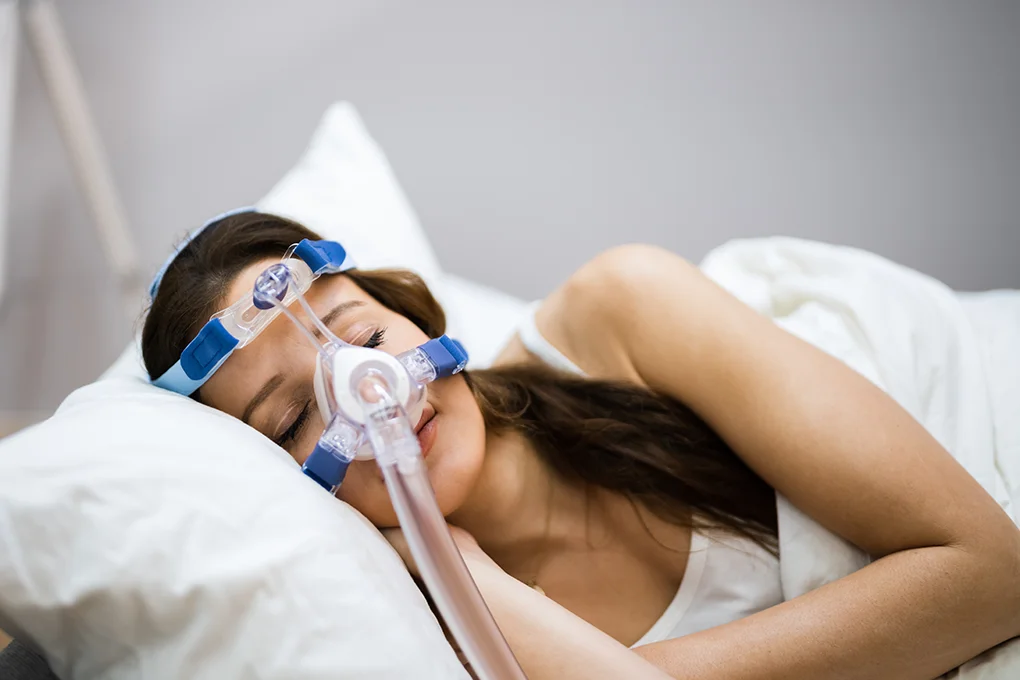
Sleep apnoea is a common yet often undiagnosed condition that affects millions worldwide. While many associate it primarily with snoring and daytime fatigue, fewer people realise how sleep apnoea impacts heart health.
The link between sleep apnoea and heart disease, or cardiovascular health, is well-established, with research showing that untreated sleep apnoea can increase the risk of high blood pressure, heart attacks, strokes, and irregular heart rhythms. Understanding the link between sleep apnoea and heart disease is important for early intervention and better health outcomes.
What is Sleep Apnoea?
Sleep apnoea is a sleep disorder characterised by repeated interruptions in breathing during sleep. There are three main types of sleep apnoea:
Obstructive Sleep Apnoea (OSA)
The most common form of sleep apnoea, OSA occurs when the muscles in the throat relax excessively during sleep, causing a temporary blockage of the airway. This leads to repeated episodes of reduced or completely halted airflow, which can result in loud snoring, choking, or gasping for breath.
Central Sleep Apnoea (CSA)
Unlike OSA, CSA is not caused by a physical obstruction. Instead, it occurs when the brain fails to send proper signals to the muscles responsible for breathing. This leads to brief periods where breathing stops altogether, often associated with underlying medical conditions such as heart failure or stroke.
Complex Sleep Apnoea Syndrome
Also known as treatment-emergent central sleep apnoea, this condition is a combination of both OSA and CSA. It is often identified when OSA symptoms persist or worsen even after initiating continuous positive airway pressure (CPAP) therapy.
How Sleep Apnoea Impacts Heart Health
The repeated pauses in breathing associated with sleep apnoea deprive the body of oxygen, forcing the heart to work harder. This leads to increased stress on the cardiovascular system, raising the risk of several conditions. Heart diseases caused by sleep apnoea include:
- High Blood Pressure: The drop in oxygen levels triggers a stress response, causing blood pressure to rise. Over time, this can lead to chronic hypertension.
- Atrial Fibrillation: Sleep apnoea has been linked to irregular heart rhythms, increasing the likelihood of atrial fibrillation, a condition that can lead to blood clots and stroke.
- Heart Attack: The combination of oxygen deprivation and increased blood pressure raises the risk of heart attacks.
- Stroke: Disrupted sleep and oxygen fluctuations can damage blood vessels, increasing the likelihood of stroke.
Identifying Symptoms and Risk Factors
Symptoms of Sleep Apnoea
Recognising signs of sleep apnoea for heart safety is important for early intervention. Key symptoms of sleep apnoea include:
- Loud, persistent snoring
- Gasping or choking during sleep
- Frequent waking at night
- Excessive daytime fatigue
- Morning headaches
- Difficulty concentrating
If left untreated, sleep apnoea symptoms can increase heart disease risk factors, contributing to serious cardiovascular problems.
Risk Factors for Sleep Apnoea
Certain factors can increase both sleep apnoea and heart disease risk. Excess weight contributes to airway obstruction and high blood pressure, and lifestyle factors such as smoking, alcohol consumption, and a sedentary lifestyle further elevate the risk. A family history of sleep apnoea can increase the likelihood of sleep apnoea, as well as being male and an older adult.
The Role of Diagnostic Testing in Early Detection
Early diagnosis of sleep apnoea is essential for managing both sleep and heart health. A SmartCare Diagnostics sleep study provides comprehensive insights into sleep disturbances and their cardiovascular impact. SmartCare Diagnostics sleep study options include:
- Home Sleep Apnoea Test (HSAT): A more convenient option for detecting moderate to severe cases.
- Cardiovascular Screenings: Evaluating heart health through blood pressure monitoring, ECGs, and other cardiovascular tests.
These assessments help determine the severity of sleep apnoea and guide appropriate treatment strategies to reduce sleep apnoea cardiovascular risks.
Treatment for Sleep Apnoea and Heart Health
Managing sleep apnoea effectively can significantly lower the risk of heart disease. Treatment options include:
- CPAP Therapy for Heart Health: Continuous Positive Airway Pressure (CPAP) therapy is the most common and effective treatment. It keeps the airway open, improving oxygen levels and reducing strain on the heart.
- Oral Appliances: Custom-fitted devices that help keep the airway open for those with mild to moderate sleep apnoea.
- Surgical Interventions: In severe cases, procedures such as uvulopalatopharyngoplasty (UPPP) or hypoglossal nerve stimulation may be recommended.
Lifestyle modifications are also extremely important in managing sleep apnoea and improving heart health. Reducing excess weight can decrease airway obstruction and lower blood pressure, while regular exercise improves cardiovascular health and reduces sleep apnoea severity. Alcohol and sedatives relax throat muscles, worsening sleep apnoea symptoms, so it’s best to avoid these substances. Sleeping on your side rather than the back can also help keep the airway open.
Addressing sleep apnoea is essential not only for improving sleep quality but also for protecting heart health. If you or a loved one experiences symptoms of sleep apnoea, seeking professional evaluation is a proactive step towards better health. A SmartCare Diagnostics sleep study can help determine whether sleep apnoea is affecting your cardiovascular system and guide appropriate treatment options. Book an appointment at SmartCare Diagnostics today for a comprehensive sleep apnoea diagnosis and heart health assessment.
Why wait or pay too much for diagnostic tests?